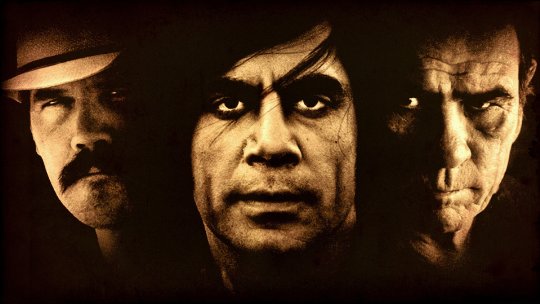Anatomy of a Scene - No Country for Old Men

It is rare to see a truly evil character. Films are full of villains, but the truly evil ones are few and far between. Javier Bardem’s Anton Chigurh is one of the rare few that is simply Evil. It isn’t only what he does that makes him evil, but how he does it. His introduction has him being calmly led to a police car and driven to a station, where we watch as he slowly escapes his bonds before wrapping the chain of his handcuffs around the deputy’s throat. There is a look of exhilaration, of excitement on his face as blood begins to spurt from the deputy’s neck, and his boots squeak across the floor. Nothing is said, and the only thing you hear are gasps of exertion and the sound of a man struggling vainly to try to save his life.
The next time we see him, he calmly kills a man on the side of the road so he can take his car. Again, there is no emotion aside from a small amount of amusement as he places the barrel of a cattle gun against his victim’s forehead. He is almost kind in the way he spoke to the man, and the death this time is swift, more a matter of convenience than necessity. He kills the man like you or I would flip off a light switch. With no thought at all.
When he walks into the gas station, we already know something bad is going to happen. This knowledge makes for a brilliant disconnect between the audience and the characters as the old man behind the counter attempts to make small talk. “Y’all getting any rain up your way?” It’s a simple question, innocuous even, but to Anton it means so much more. Someone is paying attention to him. Someone is looking at him. And he looks back.
It goes from a simple transaction to so much more with a single sentence, and as he stares down the shopkeeper, he knows that this is an encounter that was supposed to happen. He calmly places peanuts into his mouth and chews. One by one.
“What way would that be?” In that instant, everything changed. Not only for Anton and the shopkeeper, but for us as the audience. Anton’s eyes lock onto the shopkeeper as he starts questioning him, pushing him. He takes control of the scene, grabs it and forces it into submission in a way that makes us uncomfortable. The shopkeeper is confused, but we aren’t. We have to watch Anton as he toys with the man, almost like a spider weaving a web, poking and prodding at his victim to see what reaction he will get. You want to be able to look away, to have it all end, but you can’t, as the shopkeeper awkwardly stumbles over his words, and Anton just keeps staring.
“Friendo.” It’s said with contempt, his words dripping with a hidden venom as he slowly eats. The shopkeeper knows he has made a mistake, but not why. Chigurh just keeps pushing him. “I didn’t mean nothing by it.” He almost sneers back in response. “Didn’t mean nothing by it.” We can all connect to the situation on some level, and that it is so powerful. He is a man that holds so much power over others, and knows it. Like a schoolyard bully frying ants with a magnifying glass, he hurts people because he can.
As the shopkeeper tries to dig himself out of the hole he has found himself in, the tension builds. We wonder when it will happen. The sudden burst of brutal and intense violence that we just know is coming from the second Chigurh looked up at the man. We wait and wait and wait for him to strike, for him to hurt the man. Until we are almost begging for the release of it happening.
But it doesn’t come.
The movie makes us wait in agony, as he swallows and stutters and backtracks over his own words to try to appease the man in front of him. And all he gets in response is amusement. Chigurh treats the man like he is a child, and the man just accepts it. Even as Anton threatens him, tells him that he’ll come back that night and pointing out his house. But the shopkeeper doesn’t seem to notice. He just wants Anton to leave.
When a filmmaker holds a shot, it is because it important. Because we need to see it. And there is a five second hold on a shot of the peanut wrapper slowly uncrumpling on the counter in front of the man. It shows us that he has power over the man. That he could crumple him up and toss him out and it wouldn’t affect him a bit. That to Anton Chigurh, the shopkeeper is trash.
“What is the most you’ve ever lost on a coin toss?”
Fate is a powerful thing, and for many characters in this movie, Anton acts as a sort of tool of fate, killing people just because they happened to wind up in his way. And not only does he accept this role, he revels in it, uses it as his excuse to kill. If there are people standing in his way, they deserve to die. Fate put them there so he could kill them.
When he flips the coin, he sighs. It is almost rote for him at this point, this process of presiding over a life. “You know what date is on this coin? 1958. It’s been traveling 22 years to get here, and now it’s here. And it’s either heads or tails. And you have to say.” For Anton, the universe has led him to this point, much like it has led the coin. To him, he is just like the coin, and he is guided by fate towards those he must kill.
The man’s death is a foregone conclusion. “You stand to win everything.” To snatch his life away from a man who feels like it is his to do with as he pleases. Losing is the default state of this encounter, and when he wins, it is a surprise. A special moment.
“Don’t put it in your pocket. It’s your lucky quarter… Or it will get mixed in with the others and become just a coin.”
Anton Chigurh is evil not only because he kills people. He is evil because he sees himself as a god, holding power over the lives and deaths of everyone around him. If you survive, it is because it was meant to happen. If you die, it is because it was meant to happen. He has just given this man the gift of life, when he was supposed to take it away from him. He views others as nothing more than inconveniences to be toyed with until he breaks them.
He is truly evil.
_____________________________________________

Tom has been writing about media since he was a senior in high school. He likes long walks on the beach, dark liquor, and when characters reload guns in action movies.
You Might Also Like:
Anatomy of a Scene - FoxcatcherAnatomy of a Scene - Sicario
Anatomy of a Character - Pulp Fiction
_____________________________________________